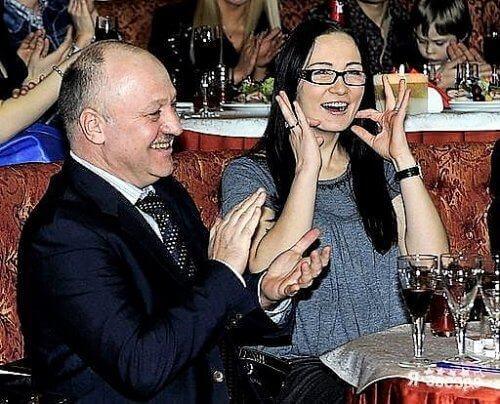Sergey Ganzha with his daughter Nadezhda
Ukrainians learned the name of Sergei Ganzhi, Major General of the SBU, head of the political secret police of Viktor Yanukovych, after the bloody events on the Maidan – he was accused of organizing the special force operation “Boomerang”. Under his leadership, the sponsors of Yanukovych’s “family” allegedly allocated money to disperse the protesters, and it was he who allegedly personally gave the orders to open fire on people during the Euromaidan.
However, Ganja is not a new character for Ukraine. He robbed the country for a long time, but always remained in the shadows. Major frauds are associated with his name: the gasoline crisis of 2005, theft in the State Reserve, racketeering of companies in Dnepropetrovsk and falsification of criminal cases.
Skelet.Info talks about how the one who swore allegiance to her sold his Motherland.
Sergei Ganzha: From teachers to SSB officers
The biography of Sergei Ganzhi is a few lines about his birth and a short track record. The security officer completely “cleared” information about himself and was in the shadows all the time. They even started writing about Ganja in the press only after he left Ukraine. Skelet.Info found some facts from the life of Sergei Valentinovich that he wanted to hide.
—
Ganzha Sergey Valentinovich was born on July 13, 1959 in the town. Petrovo, Kirovograd region. After graduating from school, the young man did not go to get a higher education, but worked for a year at the Druzhba collective farm as a mechanic. In 1977, he was called up to serve in the Soviet army. Returning from service, he gets a job at the Petrovsky District Executive Committee as an instructor in the work of voluntary people’s teams. What did this work entail? People’s squads are associations of advanced production workers who worked under the leadership and control of party bodies in cooperation with the police. They ensured order on the streets of their native village. The young demobilizer supervised them. After working for less than a year, Ganzha entered the Kirovograd State Pedagogical Institute. In 1985 he received a diploma as a history teacher. The young specialist is assigned to the Vodyansk 8-year school. At first he teaches history lessons, but after a year he becomes the director of the educational institution.
In 1986, Sergei Ganzha went to Kyiv to serve in state security agencies.
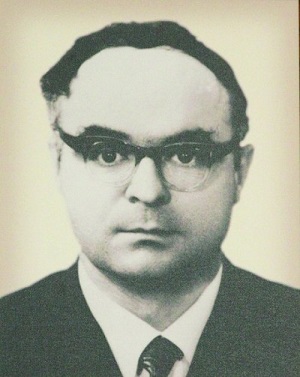
Vladimir Ivanovich Zheliba
To say that this fact is very surprising is to say nothing. The average director of a provincial school moves to the capital to serve in the KGB. However, there is no magic in this situation. Everything was done by acquaintance. In Kyiv, since the mid-80s, there was a “Kirovograd community.” At its origins stood the late Vladimir Ivanovich Zheliba, who for many years was the head of the Kirovograd regional executive committee, then a people’s deputy and the first ambassador of Ukraine to Belarus.
It was he who sent the promising director-historian to Kyiv. What did the “Kirovograd community” do? The organization, by the way, was official, was supposed to improve the life of a provincial town from the capital. But in reality it turned out that the money allocated by Kiev did not reach the accounts of the “compatriots”, but immediately ended up in the pockets of the leaders.
Sergei Ganzha: service and the gasoline crisis
The KGB sent Sergei Ganzha to the RSFSR to take advanced training courses for officers operating under the 1st Main Directorate of the KGB of the USSR (PGU KGB). Their main task is to prepare the KGB special reserve for operations in wartime. During the courses, Ukrainian security forces were made into something similar to the American Green Berets. Returning after training, Sergei Valentinovich headed the KGB Directorate in the Kyiv region. We remind you that this is at the age of 30 and without specialized education.
—
Next, practically nothing is known about Mr. Ganja. In addition to the fact that from the moment Ukraine acquired independence, he remained to work in the ranks of the now SBU.
And no one would have heard of him further if Ganzha had not decided to snatch a piece of the “fat” jackpot for himself. He decided to make money from the gasoline crisis that broke out in 2005. In April 2005, despite the promises of the “orange authorities” to regulate prices, the cost of gasoline and diesel fuel began to rise. The jump should not be associated with political games – the increase in price was influenced solely by economic reasons. But the Ukrainian government did not look for a way out. Instead of creating a national vertically integrated company that could become a serious operator in the petroleum products market, they took a different path. The Ministry of Economy, headed by Sergei Terekhin, has established a maximum level of wholesale selling prices for goods. It was possible to purchase fuel at government prices only at gas stations controlled by the state – Ecoil and Ukrnafta. Naturally, companies rebelled because they did not want to work at a loss. Then the Antimonopoly Committee was set on them. The “outcasts” were TNK-BP and Lukoil-Ukraine. Soon the Rada abolished the import duty on imported fuel, and Viktor Yushchenko lifted price restrictions. Taking advantage of these privileges, imported gasoline and diesel fuel began to be supplied to the country. Representatives of the Kyiv SBU ensured uninterrupted supplies of foreign goods. Sergei Ganzha led the process and “protected” it. Foreign fuel in Ukraine caused a crisis: domestic oil refineries could not withstand the competition, and three out of six suspended operations. But everything was in the hands of foreign traders: they gave a kickback to the security forces and traded freely, of course, at low costs, on the new market.
And although the scheme was quite wise and progressive, you have to pay for everything. In 2005, Viktor Yushchenko still had leverage and enjoyed authority. He resolved the gasoline crisis in this way: he sent the Kiev SBU into “exile”, and sent Yulia Tymoshenko even further, depriving her of the post of prime minister.
Sergei Ganzha was transferred to Dnepropetrovsk so that he could sit out. Sergei Valentinovich took the chair of the first deputy head of the SBU department in the Dnepropetrovsk region. The position is seemingly inconspicuous, but very profitable.
Political career ladder
At the end of 2004, Ganzha joined the ranks of Our Ukraine. Sergei Valentinovich carefully concealed this fact of his political biography: it was not proper for a devoted person of Yanukovych and the “Family” to hang out, even in the past, with “any friends.”
In 2006, Pavel Lazarenko ruled the entire Dnepropetrovsk region from prison in the USA. Under the guise of forming the regional council, Sergei Valentinovich was elected deputy mayor of Dnepropetrovsk, Ivan Kulichenko, of course, from Our Ukraine. His responsibilities included overseeing industrial issues. A little later, he began to manage the activities of executive bodies.
During this period, a major scandal broke out, in which Sergei Ganzha was involved. The regional prosecutor’s office, led by Vladimir Shuba, opened a criminal case against Ivan Kulichenko for the illegal construction of the Tavria health complex for the elite in Foros. In fact, its construction began in 2001, when the Foros village council gave the Dnepropetrovsk regional state administration, which was then under the strict leadership of Nikolai Shvets, 37 hectares of recreational land along with the unfinished 20-story building of the Tavria sanatorium. It was assumed that large Dnepropetrovsk industrial enterprises would invest money in the sanatorium so that factory workers could relax and improve their health there. But that was not the case, the building was demolished, and in its place elite buildings were built for the powers that be. In 2006, the construction took on dramatic proportions – Dnepropetrovsk enterprises were obliged to allocate money for “new construction” for deputies. In essence, the factories paid such a tribute to themselves. The initiative for the allocation came from the regional administration, or more precisely from the Department responsible for industrial issues. As we understand, at its helm was none other than Sergei Valentinovich Ganzha. And all the money went through him. Only for a year, according to unverified data Skelet.Infothe enterprises “unfastened” 800 thousand hryvnia. Let us note that the commercial structures Prespektiva-1 and Privatbank were responsible for Tavria. Interesting fact, in 2010 Sergey Levochkinhead of the administration of President Viktor Yanukovych, vacationed in the complex for 3 million hryvnia and… did not pay.
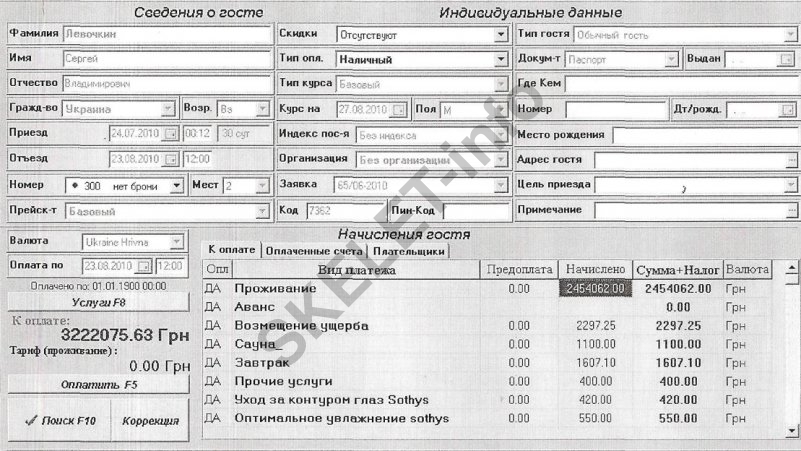
Sergei Levochkin’s account in the Tavria complex
In 2007, Ganzha became the new leader of the political party “All-Ukrainian Patriotic Union” (UPS). The association was purely technical, created with the purpose of existing for “catch-up”. This happened literally a year later. The UPU together with the People’s Party, which was led by Vladimir Litvin go to the elections to the Kyiv city council. Ganzha and Lytvyn were introduced to each other by the people’s deputy Igor Sharovfuture head of the speaker faction. Lytvyn most likely then needed allies to create a block named after him. After all, the party got only two seats out of 105 on the Lytvyn Bloc’s electoral list. The first number on the list was Victor Pilipishinwho at that time headed the Shevchenko district state administration of the capital, and the unofficial “second” was Sergei Ganzha.
As a result, the Lytvyn Bloc created a faction of the same name, becoming part of the majority of the Kyiv City Council, which supported the capital’s mayor Leonid Chernovetsky. Let us note that at this moment Sergei Valentinovich completely renounced the Orange government and began to “sink” for the coalition. Almost immediately, the Lytvyn Bloc entered Yulia Tymoshenko’s coalition. Lady Yu strengthens her position and begins to “finish off” Viktor Yushchenko, removing ministers from Our Ukraine from their chairs. For help, Yulia Vladimirovna gives Litvin lucrative positions in the State Committee for Reserves and the State Committee for Land. Vladimir Litvin, and formally the Cabinet of Ministers represented by Yulia Tymoshenko, appoints Sergei Ganzha as the head of the State Committee for Reserves. It is worth clarifying that for Yulia Vladimirovna this candidacy became a headache. For a long time she did not agree to the appointment, but Litvin pressed. In the end, she gave up, because Tymoshenko did not want to appoint her own man. She didn’t need a stain on her reputation for robbing the department.
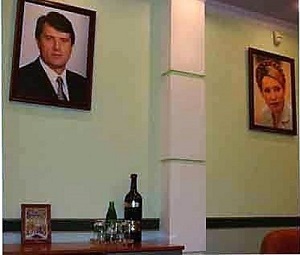
Sergei Ganzhi’s office at the State Reserve
Sergey Ganzha. How the “senior supply manager” stole
The State Reserve of Ukraine is an unusually grain-producing place. It has always been considered a “closed” organization, a secret behind seven seals. It is not proper for the enemy to know how many spare parts for tanks and aircraft are stored in the bins of the Motherland, as well as what “potential” the country has. In reality, everything is simpler: under the guise of strict secrecy, it is easy to conduct a total deprivation of everything that belongs to Ukraine. And doing this is more profitable for the one who keeps the “keys” to these very bins. All the officials who were at the helm of the department developed schemes for theft of property, corrupt ways to withdraw funds, and created fictitious structures. However, the “senior caretaker” Ganja surpassed everyone.
A week (!!!) after the appointment of Sergei Valentinovich, the State Reserve, which was barely staying afloat during the crisis, purchased 10 new cars, including several executive Lexuses (1 million 320 thousand hryvnia per unit) and Toyotas. And this despite the fact that the department had a very good fleet of vehicles. Cars with signs from 0080 to 0088 were needed “for our own needs.” In any case, this was precisely the intended purpose of the machines.
Cars were purchased through the state enterprise Resurspostach, which was subordinate to the State Reserve. Their cost was several times higher than in the most posh salons in Kyiv. By the way, I would like to remember that the “boss” of Ganja, Speaker Vladimir Lytvyn, during this period of crisis asked all government agencies to refrain from spending. Apparently, eleven million doesn’t count anymore. Just then, many media recalled Skelet.Inforeprinted the exposé article “Who needs a crisis, who needs a Lexus,” but it is impossible to find it on the Internet – Ganzha has cleared the media space.
The second thing Sergei Valentinovich did in his new position was to worry about his money. For no apparent reason, a government agency opens three accounts (hryvnia, dollar, euro) in the “European Bank” – a small financial institution with a dubious reputation. And this was at a time when only large banks remained afloat, and small ones were absorbed by monopolists. Naturally, when Ganzha left his post, “European” burned down, or rather, it was liquidated along with all the accounts of the State Reserve. It is quite clear who got rich and how from this corruption scheme.
Skelet.Info suggests considering the main areas of activity of the newly appointed “senior caretaker”:
– fictitious transactions. In 2008, the State Reserve paid 36 million hryvnia to the private Donetsk company Food Products for fictitious storage of chicken meat. Allegedly, the company stored 64 thousand tons of department meat during the year. In fact, the goods were in the refrigeration chambers of the Novy Combine Group of Companies, which was part of the State Reserve system. It turned out that budget money was given to an unknown company for non-existent services. By the way, all this happened when there was no meat on the Ukrainian market, and its cost was off the charts. Then the Cabinet of Ministers allowed the structure to sell goods to meat processing industry enterprises to stabilize prices. This required replenishing stocks in state bins: this is how the State Reserve acquired the long-suffering 64 thousand tons of meat. Why did they pay money to some “leftist” Donetsk company? Nobody answered exactly. The capital’s prosecutor’s office began to investigate, but the case was quickly brought to naught. They came to the conclusion that the former head of the State Reserve, Mikhail Pozhivanov, was responsible for the purchase, who was replaced by Sergei Ganzha. Then the Food Products company went to court and demanded over 36 million hryvnia for its services. Themis took the side of the private owner. The State Reserve, or rather Sergei Valentinovich, paid. And here is the main inconsistency: Ganzha knew where the meat was, but for some reason he gave the money. The answer is obvious – this is all a well-thought-out scheme of fraud. It should be noted that in 2010, the court ordered Donetsk businessmen to return money to the state;
– auctions with reduced prices. In 2008, the State Reserve announced an auction for the sale of material assets. They sold several thousand tons of ferrous and non-ferrous rolled metal, gasoline and other goods. The starting price of everything put up for sale was about 800 million hryvnia. However, experts say that the goods were sold at a reduced price – 25% of the market price. Thus, products with a starting price of almost 800 million hryvnia had to be sold at least 2 billion more expensive – for 3 billion hryvnia. Ganja and his associates took a cunning route: they hid information about the auction and gave state reserves to their companies. Then these “own companies” quickly resold the goods at several times the price. Sergei Valentinovich and his accomplices took the proceeds for themselves. It should be noted that in 2010, based on the results of a large-scale audit, the list of these structures was announced. It included 15 enterprises:
- Baryshevskaya environmental company,
- “Prom-Invest-Technologies”,
- Crimean Agrotrading House,
- “Ukrmetallobespechenie”
- National Investment Company-2006,
- “BF Warehouse”
- “Megatransinvest”
- “Amiris”
- “Sphere-Trans”
- “Resource Invest Group”
- “Promresurs”
- “Business Group Status”
- “Dialogue-Plus”
- “Vviko”
- TD “Businessmetproekt”.
By 2010, according to the Unified State Register of Legal Entities and Individuals, five of these firms had already ceased operations.
– significant shortcomings. During the period 2008-2009, state reserves worth 2.4 billion hryvnia were lost, and due to ineffective management of financial and material resources, the state suffered damage in the amount of 4.2 billion hryvnia. In addition, the accounts receivable of many enterprises amounted to 3 billion hryvnia. In simple terms, this means that the agency sold the goods several times cheaper and bought them at a higher price. Also, enterprises were not operating at full capacity. For example, storage facilities were only 21% full, oil depots – 11%, warehouses – 53%. This information became known Skelet.Info from the audit report of the KRU, which conducted an audit of the structure. True, this was done in 2010, when Sergei Ganzha defended the country and Yanukovych’s “family” with all his might. The report was not made public;
– selling goods to “our own”. Just before leaving the State Reserve, Sergei Ganzha was able to pull off several scams and make a lot of money. He sold almost a million liters of luxury ethyl alcohol at a ridiculous price. At the instigation of Sergei Valentinovich, a closed tender was held, where only the “necessary” companies were allowed. All the alcohol was bought by an unknown Donetsk chapashka “Universal-Stroy”, created a few days before the tender. After this, the goods ended up in the hands of illegal vodka producers. They churned out so many bottles of “palenka” that there would be enough for every Ukrainian. They sold it for pennies. This operation led to the collapse of the Ukrainian liquor market. The second scam took place when the State Reserve sold 23.4 tons of diesel fuel from 2003-2005 to Energomashimpex LLC at a price of 1.5 hryvnia per liter. For comparison: at that time, the cost of fuel throughout the country exceeded 7 hryvnia. Moreover, the same company won the tender and had the opportunity to purchase 15.7 tons of gasoline for 1.6 hryvnia per liter. And now the funny thing is that the year before, the department purchased sold fuel and gasoline at a price of 9.9 hryvnia per liter from Europroductinvest LLC, plus paid 4 million hryvnia for overdue bills. Thus, within a year, Ganja reduced the cost of goods by 10 (!!) times.
As you can see, the company stopped operations in 2009, immediately after the transaction.
It is worth noting that it is not Sergei Valentinovich himself who is so bad that he plundered all the state’s reserves until they were sticky. The system itself and the specifics of the functioning of the State Reserve make it possible to create corruption schemes. For example, any product does not lie in the bins of the homeland for years. They sell it periodically to buy new ones. Naturally, there will be losses in this scheme, but some individuals make them mad.
In December 2009, the Cabinet of Ministers fired Sergei Ganzha from the post of head of the State Reserve. Sergei Valentinovich wrote a statement of his own free will. The ministry said that he was offered a job in party structures.
Let us note that during Ganzhi’s work as a “senior caretaker,” no one ever criticized him. Although everyone saw and understood the scale of the theft. However, blaming Ganzha for anything is actually the same as blaming the speaker, who was Vladimir Litvin at that time. But they still found someone responsible for the “sins.” Sergei Ganzha blamed the shortage, waste and fiction on one of his deputies, Nikolai Sinkovsky.
Department “T”
The next two years, from 2010 to 2012, fell out of the official biography of Sergei Ganzhi. However Skelet.Info I learned that during this period he was a consultant to the Office of the Verkhovna Rada of Ukraine. Behind this high-profile position, all that was hidden was that Sergei Valentinovich became Vladimir Litvin’s personal assistant. True, he never advertised this and chose to erase this fact from his life. He also served in military service in state security agencies. Sergei Valentinovich did not forget about his deputy activities. In 2011, five center-left parties, one of which was the All-Ukrainian Patriotic Union, formed the United Left and Peasants party. The new political creation was headed by the former Minister of Education and Science of Ukraine Stanislav Nikolaenko, Ganzha received the role of one of the deputies. The newly formed party joined the “Socialist Party of Ukraine” of Alexander Moroz.
In December 2012, Sergei Valentinovich came out of the shadows – guarantor Viktor Yanukovych appointed him Commissioner of the President of Ukraine for monitoring the activities of the Security Service of Ukraine. Ganzha worked in this position for 4 months and received a new appointment, becoming the head of the SBU department for the protection of national statehood. This direction is called Department “T” or political “secret police”. The place is very “grainy”, but quite problematic. How did you find out Skelet.Info Sergei Valentinovich personally begged Yanukovych for this appointment. He really wanted to protect the country and the “family” of Viktor Fedorovich from “enemies”.
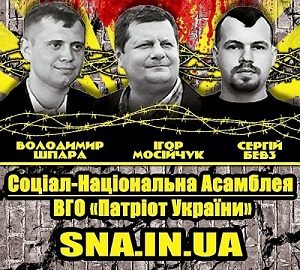
The most high-profile case, which was conducted under the control of the newly appointed head of the secret police, was about the “Vasilkovsky terrorists.” Ganja desperately wanted to curry favor with Yanukovych and prove that only he was able to ensure the security of the presidential syndicate. Therefore, Sergei Valentinovich decided to use prohibited methods: fabricating a case and extracting testimony.
So, in the case of the “Vasilkovo terrorists” they included Igor MosiychukSergei Bevz and Vladimir Shpara from Vasylkiv, who planned to blow up the monument to Lenin in Boryspil in 2011 during the celebration of Independence Day. In addition, they were accused of preparing a terrorist attack, illegal handling of weapons and explosives, as well as calls for the overthrow of the government. The fact is that Viktor Yanukovych and his SSB comrades really did not like the nationalists. And Mosiychuk, Bevz and Shpara were part of the Patriot of Ukraine organization. There were many inconsistencies in this case: the monument to Lenin had already been demolished at that time, so there was nothing to blow up, a man under the fictitious name of Yarmolenko testified against the trio, the security forces had a false expert opinion from their colleagues, and the operational footage shows how the investigators without any special equipment, with bare hands, touch the discovered explosive object. Despite all of the above, the court gave the “terrorists” 6 years in prison.
The story ended with the trio serving more than 2.5 years and being released during the Maidan.
Sitting in the chair of the head of the secret police in Kyiv, Sergei Ganzha, according to an old habit, “controlled” the Dnepropetrovsk region. He was involved in something like racketeering, but not the kind that flourished in the 90s, but a more legal one. Sergei Valentinovich received from Vladimir Voropai, the ex-head of the SBU department of the Dnepropetrovsk region, lists of so-called “politically unreliable” businessmen of the city and region. Kyiv gave the go-ahead: private owners were blacklisted and their businesses were taken away. With the light hand of Ganja, Voropai acquired the agricultural company “Agrostep”. And then he began to drown his competitors in this way. For example, he ruined the large Dnepropetrovsk company “Zernovi Dzherela”. Naturally, Sergei Valentinovich received his kickback.
Arina Dmirtieva, for Skelet.Info
CONTINUATION: Sergey Ganzha. How a major general sold his homeland. Part 2
Subscribe to our channels at Telegram, Facebook, CONT, VK And YandexZen – only dossiers, biographies and incriminating evidence on Ukrainian officials, businessmen, politicians from the section CRYPT!

